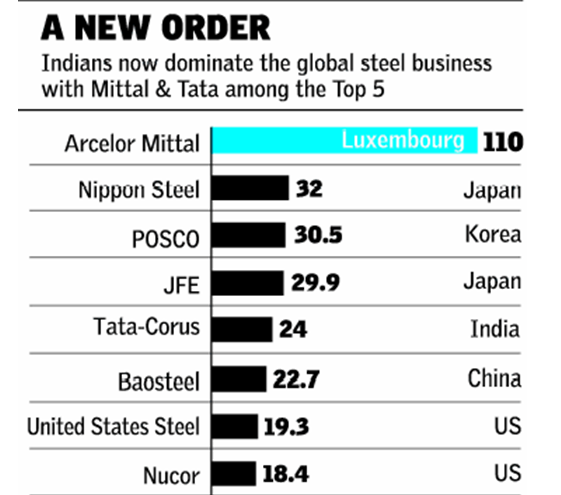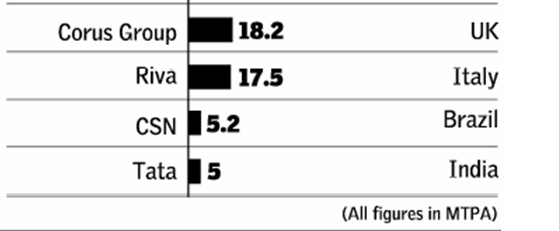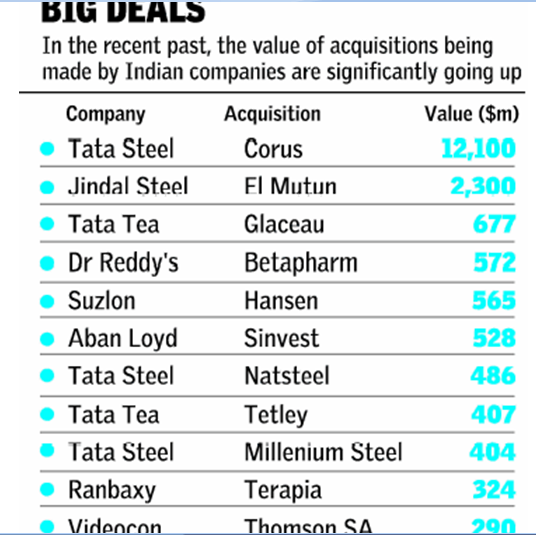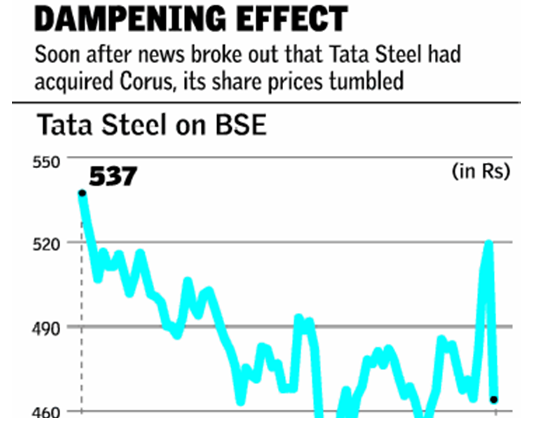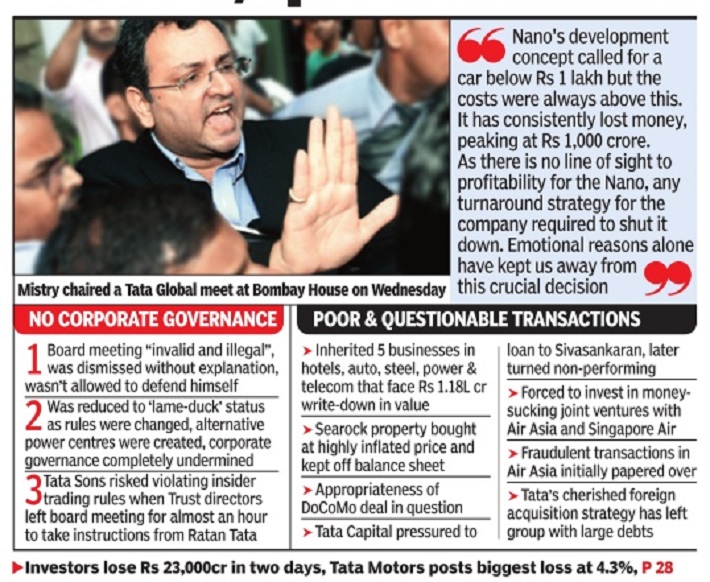The Tata Group

ii) The turnover and market capitalisation of the Tata Group, 1991-2016, under Ratan Tata and Cyrus Mistry.
iii) The performance of Tata companies under Cyrus Mistry, 2012-16.
The Times of India

This is a collection of articles archived for the excellence of their content. Readers will be able to edit existing articles and post new articles directly |
Contents |
The Tata group
As in Oct 2016
AFP | Oct 25, 2016 Steel to salt: 10 key facts about Tata Group
India's largest conglomerate Tata Sons is back in the hands of Ratan Tata after the sudden sacking of Cyrus Mistry. Here are key things you need to know about the Indian giant.
1. It is arguably India's most famous family conglomerate. Established by Parsi industrialist Jamsetji Tata in 1868, the sprawling steel-to-salt conglomerate is now worth more than $100 billion and operates in more than 100 countries globally. Tata Sons is the holding company of the Tata Group.
2. There are very few areas into which Tata has not ventured, with the group dealing in everything from salt and tea to watches, luxury cars and opulent five-star hotels.
3. Its most high-profile companies are India's largest carmaker Tata Motors, which owns Britain's Jaguar Land Rover, the IT outsourcing giant Tata Consultancy Services (TCS), Tata Steel, Tata Global beverages and Tata Chemicals.
4. The Tata Group is also in telecommunications through its company Tata Teleservices while its hotel chain runs Mumbai's Taj Mahal Palace and other high-end establishments.
5. Tata's tentacles have stretched across the globe in recent years as it went on a buying spree, picking up a number of major names including Britain's Tetley Tea and the Anglo-Dutch steel firm Corus.
6. Ratan Tata, the media-shy septuagenarian, has taken interim charge, four years after making way for Mistry, and is leading the hunt for a new successor.
7. Tata took the reins of the group in 1991 and led it for 21 years during which he was credited with driving its expansion abroad in the 2000s.
8. Each Tata company operates independently and has its own board of directors answerable to shareholders. Notable CEOs include Guenter Butschek at Tata Motors and Natarajan Chandrasekaran of TCS.
9. Like many businesses, it's facing major headwinds in the form of the sluggish global economy, volatile currencies and fluctuating commodity prices. Tata Group's revenue slipped 4.6 percent for the financial year ended March while a number of its firms have their own problems. Tata Steel is the most notable. It's struggling to find a buyer for its huge loss-making British assets, with 15,000 jobs in the UK at risk, while TCS profits are down as clients tighten their purse strings.
10. Tata Motors is also bearing the brunt of weak sales of its luxury unit Jaguar Land Rover, while Japanese mobile services provider NTT Docomo is demanding Tata coughs up a $1.17 billion arbitration payment awarded at an international hearing.
Tata Group's overseas takeovers
Times of India [ 20 Oct, 2006 PTI ]
Snapshot of Tata Group's takeovers abroad
NEW DELHI: Tata Steel's successful move to acquire its much bigger rival Corus Group is the latest in a series of takeovers abroad executed by India's largest and one of the oldest corporate groups.
The acquisitions have meant that 30 per cent of the group's revenues today come from overseas operations.
Following are the major acquisitions by Tata Group companies in the past few years:
- Tata Tea acquires 30% in US' Glaceau (Energy Brands) in August 2006 for $677 mn
- Tata Tea buys 33 per cent in South African tea company Joekels through its subsidiary Tetley Group
- Tata Tea acquires US-based Eight'O clock coffee company for $220 mn (Rs 1,050 cr) in June 2006
- Tata Chemicals picks 63.5% in UK's Brunner Mond Group for Rs 508 crore in December 2005
- Tata Steel acquires Millennium Steel of Thailand in December 2005 for $404 mn (Rs 1,800 crore)
- TCS buys out Chilean BPO firm Comicorn for $23 mn (Rs 107.02 crore) in November 2005
- TCS acquires Sydney-based FNS in October 2005
- Tata Technologies purchases INCAT International, UK in October 2005 for $91 mn (Rs 411 crore)
- Tata Tea acquires Good Earth Corp in October 2005 for around $32 mn
- Tata Auto Comp (TACO) takes over German auto components maker Wundsch Weidinger
- VSNL acquires Teleglobe International in July 2005 for $239 mn
- Tata Steel buys Singapore's NatSteel in August 2004 for over Rs 1,300 crore.
- VSNL takes over Tyco Global Network for $150 mn (Rs 690 crore)
- Tata Chemical acquires Moroccan company Indo-Maroc Phosphore for Rs 166 crore
- Tata Motors picks 21% stake in Spain's Hispano Carrocera for Rs 70 crore
- Tata Tea buys Tetley, UK in February 2000 for Rs 1,870 crore
- Tata Motors takes over Daewoo Commercial Vehicle Company of Korea in March 2004 for Rs 459 crore.
Acquisitions
INDIA ON SONG, TAKES CORUS ALONG
Tatas Outgun Brazilians, Take World By Storm
Mumbai: India’s high noon came when it was midnight in London. In the duel between the Tatas and Brazil’s CSN for Anglo-Dutch steelmaker Corus, the Indians held their nerve as the auction went into the ninth and final round. CSN bid 603 pence to a share; the Tatas, who had made an offer of 590p in the eighth round, upped it by 18p to 608p. The Brazilians blinked.
For $12 billion, Rs 54,000 crore if you will, Tata Steel created history when it finally secured the scalp it wanted so badly — that of Anglo-Dutch steelmaker Corus, forged out of what was once the mighty British Steel — to carve out for itself a chunk of the global steel industry.
This acquisition makes the 100-year-old Tata Steel the fifth largest steel producer in the world, with an annual output of around 25 million tonnes and 87,000 employees on its rolls — a dramatic departure from only a day ago when it was ranked 56th.
The acquisition also marks the emergence of India Inc as a potent force in the global business. It was only last year that Mittal Steel headed by Lakshmi Mittal forged a blockbuster $32.4 billion deal to create Arcelor Mittal, the world’s largest steel company. ‘‘I believe this will be the first step in ensuring that Indian industry can step outside the shores of India in an international market and acquit itself as a global player,’’ said Ratan Tata, chairman, Tata Group.
While Corus Steel’s fate was eventually decided during the course of a single night, the process to find a buyer for the beleaguered European company had started in October 2005, when its bankers, Credit Suisse, set up Project England, the code name for a potential sale.
At that time, Corus was trading on the London Stock Exchange (LSE) at 300 pence a share. ‘‘We didn’t go to them, they came to us, much before Mittal started talking to Arcelor,’’ said Ratan Tata, one of the earlier suitors wooed by Corus.
EMPIRE STRIKES BACK
A hundred years ago, the chief of British railways had poked fun at Jamsetji’s steel dreams... A Big Deal: Winners, Losers Rs 54,000 Crore Tatas to pay $12 bn (Rs 54,000 crore) to acquire Corus at 608 pence (Rs 526 ) per share, which is about 34% higher than its original offer of 455p (Rs 389) made on October 20. It’s also 70% higher than Corus’s average share price over the year prior to the original Tata offer. Tata Steel’s share price, at the end of trading on Jan 31 (Wed) is about 9% down from when it made the first offer while Corus’ is up 27% Tata Steel shareholders have lost, at least in the short-term, while Corus shareholders have gained big-time with shares at seven-year high
Where will the money come from
Of the $12bn, $4.1 bn will be pumped in as cash through the equity route by Tata Steel. The rest will be in the form of debt raised from three banks, ABN Amro, Credit Suisse & Deutsche Bank. The equity will be bridge financed
Market is not happy
CLSA, one of the largest foreign brokerage houses in India, has put a ‘sell’ advice on Tata Steel, saying it had paid too much for Corus. Tata Steel stock closed almost 11% lower at Rs 464 from Tues closing
SPEEDBREAKERS
The British Steel Workers Union has vowed to oppose the deal tooth and nail
The Benefits Triples Tata Steel’s capacity to almost 28m tonnes from 8.7 million in an industry where consolidation appears inevitable in order to leverage scales Gives it access to high-value Euroopean market; also it can ride on the back of a renowned brand Acquisition cost’s about $710 per tonne whereas greenfield would have cost $1200 per tonne, say Tatas
The Dangers
Tatas have paid a heavy price. The final offer is nine times Corus’ earnings before interest, tax, depreciation and amortisation (EBIDTA), while Mittal paid less than five times Arcelor’s earnings It now needs to service a very large debt burden Integration can be a problem in such acquisitions, because of both distance and culture
It’s by far the biggest takeover in the history of India Inc 2nd biggest acquisition in global steel, behind Mittal’s Steel’s $38.3bn takeover of Arcelor last year
Lifts Tata Steel from 56th to 5th in global steel sweepstakes with combined revenue of $24.4bn. Two of the top 5 are now in Indian hands; Lakshmi Mittal’s Mittal-Arcelor is No. 1
Tatas overtake the Mukesh Ambani-Reliance Group to become India’s largest business house. Revenues vault from Rs 70,509 cr last year to Rs 148,885 cr, compared to Reliance’s Rs 88,965 cr. Combined m-cap, at Rs 299,075 cr, is higher than Reliance’s Rs 228,677 cr
When we first talked about acquiring Corus, many thought it was an audacious move for an Indian company to make a bid for a European steel company much larger than itself. That was something which had not happened before...This will be the first step in ensuring that Indian industry can step outside the shores of India in an international market and acquit itself as a global player
Research and development
The Times of India, May 14 2015
Reeba Zachariah
Tatas bet on innovation with $2.6bn R&D spend
In what could be the highest research and development (R&D) expenditure by an Indian conglomerate, the salt-to-software Tata Group spends Rs 16,000 crore, or $2.6 billion, on innovations as the Cyrus Mistry-led enterprise bets big on new technologies to boost growth. The diversified Indian multinational spends 2.5% of its revenue on R&D, which is much higher than the government's R&D spend of 0.9% of the country's gross domestic product (GDP).
A significant amount of the total R&D expenditure by the $103-billion conglomerate goes into automotive, software, materials and metallurgy, with Tata Motors being the most lavish spender within the group. The other major spenders within the group are Tata Steel, Tata Consultancy Services (TCS) and Tata Global Beverages.
The group's research bill has gone up by 28% from Rs 12,500 crore three years ago.
While Nano remains its flag-bearer of innovation, the group's other path-breaking products include Titan Edge, the thinnest watch, and Tata Swach, the world's low-cost water purifier. The conglomerate, under the Tata Innovista programme, has been con ducting research in several areas like products, services, processes, digitization and design, expecting them to deliver billions of dollars in revenue.
Launched in 2006, the Tata Innovista programme promotes innovation across Tata companies worldwide. Over the past decade, it has seen a 15-fold increase in innovation across 70 companies. The top innovation projects this year are expected to deliver an estimated benefit of $1.1 billion annually , the Tata Group said.
Cyrus Mistry, 2012-16
See graphic

The Times of India
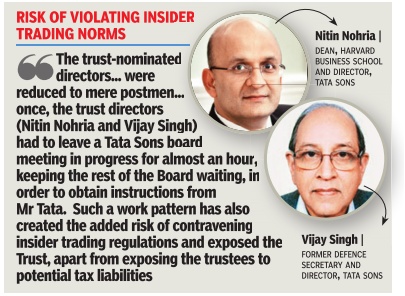
The Times of India
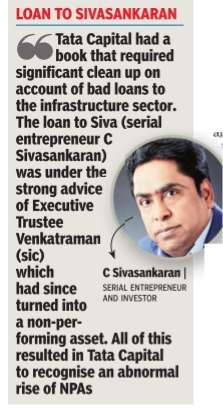
The Times of India
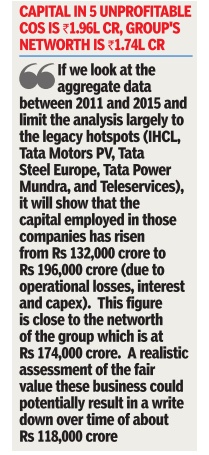
The Times of India
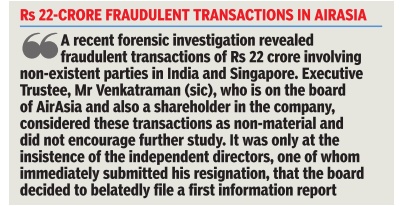
The Times of India
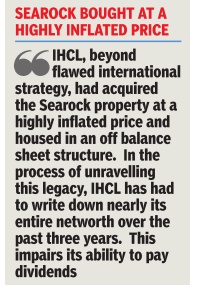
The Times of India
Cyrus Mistry’s big decision
- Mistry worked with his family enterprise Shapoorji Pallonji group, a real estate and construction giant.
- The most important decision Mistry took was to sell the beleaguered steel business in the UK
- This was a tough decision for Mistry considering that the acquisition of Corus in 2007, led by Ratan Tata himself.
MUMBAI: The kind of changes Cyrus Mistry brought about while at the helm of the Tata Group reflected that he was in a hurry to bring in a transformation. After all, Mistry was handed over a legacy he did not help create, unlike several other Tata Group chiefs who worked and rose through the ranks of the group companies.
Ratan Tata, whom Cyrus had replaced four years ago, had started his career in the Tatas at Nelco, which made a mark with its Nelco Blue Diamond colour TVs. JRD Tata, Ratan Tata's predecessor, has been a Tata lifer. In contrast, Mistry worked with his family enterprise Shapoorji Pallonji (SP) group, a real estate and construction giant. With nearly 18.5% holding, the SP group is the single largest shareholder in Tata Sons, the main promoter of most of the Tata Group companies. In November 2011, he was picked as Ratan Tata's successor to lead the $100-billion-plus group.
In his less than four-year tenure, perhaps the most important decision Mistry took was to sell the beleaguered steel business in the UK, which was turning out to be a drain on Tata Steel's balance sheet. This was a tough decision for Mistry considering that the acquisition of Corus in 2007, led by Ratan Tata himself, was considered to be an audacious move by an Indian entity. This, along with the group acquisition of the iconic auto brand Jaguar Land Rover, bolstered the Tatas' image globally. Recently, the group also decided to exit the urea business — another legacy of the past — to Yara Group of Norway.
Apart from undoing some of the legacies of the group, Mistry took the conglomerate into the new age e-commerce business with Tata CLiQ. As he prepared the blueprint for the group's new business strategy, Mistry also looked to expand the defence business. Early this year, the group sold 74% in data centre unit of Tata Communications to Temasek Holdings-owned Singapore Technologies Telemedia for $500 million. And in September this year, Mistry made it clear that the group won't shy away from paring more assets if needed. He was clearly looking to cut down on debt, which had ballooned to $24.5 billion.
During Mistry's term, high-value legal cases also rose sharply. The Tatas are fighting DoCoMo of Japan, its telecom partner, in a $1.7-billion lawsuit which has also impacted the Tata name badly. TCS, a group company, is also facing a $940 million lawsuit in the US.
During the months leading to his exit+ , Mistry was slowly coming into his own and steadily changing the way the group conducts its business. Mistry recently said group companies "need to earn the right to grow", hinting that performance of each of the group company would determine its place in the portfolio.
Why Mistry was 'abruptly' sacked as Tata chairman
- The old guard, known for honouring commitments, was unhappy with the way dispute with DoCoMo was handled
- Some observers believe the trusts weren’t fully in sync with the functioning of the Group Executive Council set up by Mistry.
- Mistry had a different management perspective and perhaps needed time to evolve
MUMBAI: Seasoned Bombay House watchers offer illuminating pictures of how the Tatas handled the Corus acquisition (under Ratan Tata) in contrast to the messy divorce from DoCoMo (under Cyrus Mistry) to underscore the change in management styles+ and perhaps explain Mistry's abrupt dismissal.
A top investment banker recalled that Credit Suisse had offered Tatas a financing package that helped it aggressively outbid its Brazilian rival for Corus Steel in the UK. Once the deal was done, two other MNC banks approached the company's top brass with a more comfortable funding plan involving cost savings of about $400 million. As Tata Steel weighed in favour of the new funding option, Credit Suisse fetched up with a letter from the Tatas showing its commitment to $120 million in fees whether or not the financing was availed from it.
Bombay House top brass was left fuming that a bank had the temerity to place a demand on them. But when the matter was taken up to the then group chairman Ratan Tata, his decision was simple: There was a commitment made to Credit Suisse which must be honoured. Having paid the European bank, Tata Steel went ahead with the cheaper financing option.
Almost a decade later, Tata is telling DoCoMo, the Japanese partner in the troubled telecom business, that it would honour a put option to buy out at a pre-determined price but with a caveat. It would have to comply with Indian regulations. It's a small tweak to the much storied magnanimity and commitment of the Tatas. DoCoMo has already won the arbitration and blamed Tata's adamant stance for not resolving the dispute. (RBI had rejected Tata's proposal to pay a price which is higher than the 'fair value' to buy out its Japanese partner's stake after the finance ministry told the central bank to 'stick to the rules', leaving the issue to be resolved through arbitration).
"For a nuanced Tata watcher, this was a big change. In the past, Tatas would have told a battery of lawyers that there's a commitment and they must find a way around the problem," says the person quoted above. "The philosophy out there was that we would be fine in the long run," he adds, while explaining how this has served the group well over time. "What is the Tata Group? A string of under performing companies, if you exclude TCS and JLR, but strutting around because of the value system it firmly holds," says a person who has worked with the Bombay House extensively.
Was Tata Changing?
Also, there were indications that the group was getting preoccupied with decimal points, with a newfound eagerness to gather the last rupee. This was a mindset shift which roiled the Japanese ally and stymied other divestment plans aimed at de-leveraging the group's nearly $25-billion debt, says the banker mentioned earlier. It also surprised some insiders, including the Trusts that control Tata Sons, the holding company of the diversified salt-to-software behemoth. The Trusts started taking a keen interest in Mistry's new book-keeping ways.
Not just that. The handling of a harassment case at a group company, involving a senior functionary, led to considerable consternation among old-timers who were left fretting at the ways Tata was changing. The complainant had approached the chairman before quitting the job in disquiet. "The message from the top to a distraught employee didn't befit the group or the post," says the second person, cited earlier, with access to the group.
With the Tata Trusts turning their attention to the recent developments, strategic decisions across group companies were being elevated to the Tata Sons board. This reduced the space to maneuver for Mistry.
Some observers believe the trusts weren't fully in sync with the functioning of the Group Executive Council set up by Mistry, which worked closely with the boards, CEOs and senior management of Tata companies. There was strong criticism of GEC members Madhu Kannan, Nirmalya Kumar, and N S Rajan who now face an uncertain future. The Trusts, which have majority voting rights in Tata Sons' board, had started assessing the changed management style and its impact on the group which is facing sluggish growth.
5th Year That Wasn't
These developments came to the forefront even as Mistry entered his fifth year as chairman and was due for, most thought, a routine renewal.
Mistry, who spearheaded Shapoorji Pallonji Group before taking over the mantle at the Tata Group, was perceived to be attempting to secure his position by building strong ties with the country's political establishment. Some of his GEC appointees reportedly advised Mistry that as Tata chairman he had an opportunity to play a bigger role with the establishment at a time when the credibility of most business houses stood diminished.
Top Comment
Tatas are so attached to their values that they cannot see it getting compromised at whatever the cost. If they were driven by profit alone they would have conquered the world by now.Chirag Chaudhary
Mistry had a different management perspective and perhaps needed time to evolve. His backers saw in him a chairman who struggled with a difficult global economy and some unwieldy acquisitions he inherited.
Mistry, only the second group chairman not to have a Tata surname, was initially part of selection committee searching for Ratan Tata's successor. He so impressed fellow committee members during deliberations — detailing what a future Tata chairman should be like — that they actually gave him the job. In the end, it didn't quite work out. "Ratan Tata is a big picture man, a visionary. Mistry brims with energy and is very hands-on (for a Tata chairman). The change was very 'in- your-face' for the old-guard," one of the senior-most CEOs at the group said. He had to go.
Not abrupt, the ouster had been building up
Boby Kurian and team, Seems sudden, but was building up, Oct 25 2016 : The Times of India
Replacement To Be Named In 4 Months
For the past few months, TOI's national corporate editor, Boby Kurian, had been working on a story that all was not well within the House of Tata. He had heard reports of rising tension between Cyrus Mistry -who took over as chairman of India's largest conglomerate in December 2012 from Ratan Tata -and the `old guard'. There were many theories -ranging from unhappiness over the group's performance, to the handling of certain situations and companies -none of which could be confirmed.At the core, though, there appeared to be a clash of cultu res and management styles; there was concern over the erosion of long-held “values“ and the reversal of some policies and practices.
But the stunning suddenness with which the Tatas on Monday evening announced the replacement of Mistry , aged 48, and the temporary return of his 78-year-old predecessor to the helm has left India Inc in a state of shock.
What makes the sacking as extraordinary as it is dramatic is the fact that Mistry is not just another executive; he is son of construction tycoon Pallonji Mistry , the single lar gest individual shareholder in Tata Sons--the group's holding company--with a stake of 18.5%. But 66% is controlled by the Tata Trusts, whose life-long chairman is Ratan Tata (rest 15.5% of Tata Sons is held by group firms). Some years ago, the Articles of Association of Tata Sons were changed to give the trusts sweeping powers in the selection and removal of a chairman.
Conversations with people within or close to the group indicate that the decision was not as abrupt as it appears to be. Said one of them, “It seems to have happened in a hurry , but it was building up.“
The recent induction of industrialist Venu Srinivasan and Bain Capital managing director Amit Chandra to the board -apparently without even consulting Mistry -is now being seen as a precursor to the surgical strike against him.
Given the financial and family backing that Cyrus enjoys, any legal challenge he mounts against his dismissal could lead to uncertainty both within and outside the group, at a time when a number of its companies aren't doing very well.
A marathon meeting of the Tata Sons board was follo wed by a terse press release to announce that Mistry was being “replaced“ by Ratan Tata as “interim chairman“ and a five-member committee had been constituted to choose a successor within four months. It is said to have taken even top group executives who were physically present in Bombay House, the headquarters of the Tatas, by surprise; one CEO apparently called another and said, “Switch on your TV .“
Of the nine-member board, six are believed to have voted against Mistry while two abstained (Mistry didn't have a vote on this). Speculation is rife as to the identities of the two who abstained from voting.
In the hours that followed, the five-member Group Ex ecutive Council that Mistry had set up in 2103 was disbanded amid reports that three of them might be asked to leave the group. Tellingly , an interview Mistry had given to Tata Review, an in-house magazine, could no longer be found on the official website.
According to a business TV channel, the Tata Sons board had sought the legal opinion of P Chidambaram, R V Raveendran and Mohan Parasaran, who have served as Union finance minister, Supreme Court judge and solicitor general respectively. At least one part of that information turned out to be inaccurate; TOI has learnt that Parasaran will actually be representing Mistry in court.As for Chidambaram, he told TOI when asked for confirmation, “That's a question no one can ask any lawyer.“
The Tata Sons press release said the committee to choose a new chairman would comprise Tata, TVS chairman Venu Srinivasan, Bain Capital managing director Amit Chandra, former ambassador to the US and Russia Ronen Sen, and UK-based manufacturing guru Lord Kumar Bhattacharya, all of whom are on the board of Tata Sons. The committee had been “mandated to complete the selection process in four months,“ it added.
Sale of assets, falling revenue worried Tata Trusts
Sale of assets, falling revenue worried Tata Trusts, old timers, Oct 26 2016 : The Times of India
The Tata Trusts were concerned over the falling revenues of the group since Cyrus Mistry took over the reins of the company and there was a growing divergence over values and ethics, people close to the Tata Group have revealed in interviews to a television channel.
A day after the dramatic removal of Mistry , at least three people close to the Tata Group have spoken about the possible reasons for the dismissal of the former Tata Sons chairman.
“Since Cyrus took over, there's no formal link between trusts and Tata Group. The trusts are dependent for philanthropic activities on dividends on shares we hold. The performance of Tata Sons was becoming more and more dependent on just 2 cos -TCS & JLR,“ V R Mehta, trustee at the Sir Dorabji Tata Trust, was quoted as saying by NDTV .
“The trusts were concerned about falling revenue (since Mistry took over) -funds for charitable work were drying up. There's been divergence since Mistry took over on values and ethics. The trusts' concerns were a major factor in Cyrus' removal. Probably , no choices were left,“ Mehta was quoted as saying.
Noted lawyer Harish Salve, who is a legal expert for the salt-to-software group, told NDTV that the “group felt its formidable international reputation was being compromised“. “I'm sure all the people concerned here know they are not fighting for a piece of land or property ,“ Salve was quoted as saying by the TV channel.
He also said Mistry's move to sell group assets to pare debt was also a factor which had worried Tata Group old timers. “Tata has a reputation for weathering storms,“ Salve was quoted as saying by NDTV . He said Tata's approach had been not to “ditch assets in difficult times....try to fix it before you dismantle“.
Salve told the channel that the move to sell Tata Steel's assets in UK was seen as reversing the acquisitions undertaken by Ratan Tata because when the group acquired those assets, “it was not just buying a business, it was buying into an institution“.
The eminent lawyer said the decision to dismiss Mistry may not have been sudden and admitted that it had created some “bad blood“. “When it comes to governance of an institution, sometimes things don't go right, there is hurt, there is disappointment, sometimes there is also a sense of humiliation,“ Salve was quoted as saying by NDTV .
Another eminent lawyer, Mohan Parasaran, who has advised the Tata Group on the Mistry issue, said Ratan Tata had met Mistry before the board meeting on Monday and had asked him to quit. “I was approached a month back and gave an opinion to them on this issue. I said the board was competent to appoint chairman following their articles of association. They will need to appoint a selection committee. But there's no need of a selection committee for the removal. For that, a majority of directors is needed,“ Parasaran was quoted as saying.
“I was told that Ratan Tata and a board member came all the way from the US (Harvard Business School dean Nitin Nohria) to meet Cyrus to persuade him to step down. Mistry had his own views and refused -he is entitled to his views.“
Reeba Zachariah & Partha Sinha, Hidden agenda in `other items'?, Oct 26 2016 : The Times of India
Usually board members are informed in advance about the agenda for a meeting so that they have enough time to prepare for discussions that would come up during those meetings.Normally those meetings are predictable too.
However, the Tata Sons board meeting on October 24 deviated from the usual routine.Before the board of directors gathered, the entire agenda for the meeting was shared with all of them but for one item, which was not shared with Cyrus Mistry , the chairman of the board. This one entry , listed among `other items' was the crucial proposal that con cerned Mistry's tenure as chief of Tata Sons. This `item' was, for some reason, buried among several other items.What's even more curious is that this particular `other item' was missing from the no te that was sent to Mistry.
So, in effect, eight of the nine-member Tata Sons board knew that they would discuss cutting short Mistry's tenure as chairman at one of India's richest privately-held companies. Mistry , who was till then the chairman of the board, had no idea about it. This also raises the question of who moved this particular `other item' at the board meet that ran for several hours.
However, Mistry was aware by then that a faction of the board was keen to see him step down. Ratan Tata and Nitin Nohria, dean of the Harvard Business School, had met him and “tried to persuade him“ to step down, according to one of the group's legal advisors Mohan Parasaran. Mistry rejec ted the suggestion.
At the meeting that followed, six of the eight members excluding Mistry voted in favour of his removal while two abstained. According to a lawyer, if there is a controversial item in the board agenda, the person against whom the particular item has been moved will not participate in the vote. That, probably, explains why Mistry didn't vote during the October 24 meeting.“Good governance requires that you don't participate in the voting if the matter is related to you,“ the lawyer said.
A spokesperson for Tata Trusts, the largest shareholder of Tata Sons, said all the processes were followed during the crucial Monday board meeting.
Cyrus Mistry’s point of view
'Nano has consistently lost money... has not been shut for emotional reasons alone': Cyrus Mistry in his letter to Tata Sons
The Times of India Reproduces Sacked Tata Sons Chairman Cyrus Mistry's Email To Board Directors Of Holding Co And Tata Trustees
DIRECTORS OF TATA SONS LTD
I was shocked beyond words at the happenings at the board meeting of October 24, 2016.
Apart from the invalidity and illegality of the business that was conducted, I have to say that the board of directors has not covered itself with glory. To "replace" your chairman without so much as a word of explanation and without affording him an opportunity of defending himself in a summary manner must be unique in the annals of corporate history .The suddenness of the action, and the lack of explanation has led to all manner of speculation and has done my reputation and the reputation of the Tata Group immeasurable harm. At the outset, I have to say that I have great respect for the Tata Group and the thousands of employees who are working hard despite the challenges. I am writing this letter to the board to emphasise the total lack of corporate governance and to point out the failure on the part of the directors to discharge the fiduciary duty owed to stakeholders of Tata Sons and of the group of companies. All of this does not augur well for the future of the group.All that is said here is well known to many among you, but I would like to put in one place my journey as chairman of Tata Sons.It is important to emphasise the enormity of what has transpired in the group and what corrective action is to be taken. Each of you is already in receipt of and familiar with the Strategy 2025 document that I presented to you, and in which I had articulated our growth strategy for the future.
In 2011, after some exploration by a search committee, I was approached by both Ratan Tata and Lord Bhattacharyya individually to be a candidate for the position.I politely declined. I had myself built a business which I would continue to run. However, as the search process progressed and the committee was unable to find a suitable candidate, I was asked to reconsider. After consulting my family and in the broader interests of the Tata Group, I took courage to overcome my initial reluctance and agreed to consider the position.
Prior to my appointment, I was assured that I would be given a free hand. The previous chairman was to step back and be available for advice and guidance as and when needed. After my appointment, the Articles of Association were modified, changing the rules of engagement between the Trusts, the board of Tata Sons, the chairman, and the operating companies. Inappropriate interpretation indeed followed, and as elaborated below, it severely constrained the ability of the group to engineer the necessary turnaround.
I am not sure if the individual board members and the trustees truly appreciated the extent of the problems I had inherited. I cannot blame them, for I myself, as a nonexecutive director, did not have a clear grasp of the gravity of the issues involved. Without meaning to air a laundry list, let me outline some of the major challenges faced at the time of my entry .
As is public knowledge, the foreign acquisition strategy , with the exceptions of JLR and Tetley , had left a large debt overhang.The European steel business faced potential impairments in the excess of $10 billion, only some of which has been taken as of date. Many foreign properties of IHCL and holdings in Orient Hotels have been sold at a loss.The onerous terms of the lease for Pierre in New York are such that it would make it a challenge to exit. Tata Chemicals still needs tough decisions about its UK and Kenya operations.
IHCL, beyond flawed international strategy , had acquired the Searock property at a highly inflated price and housed in an off balance sheet structure. In the process of unravelling this legacy , IHCL has had to write down nearly its entire networth over the past three years. This impairs its ability to pay dividends.
Tata Capital had a book that required significant clean up on account of bad loans to the infrastructure sector. The loan to Siva was under the strong advice of Executive Trustee Venkatraman (sic) which had since turned into a non-performing asset. All of this resulted in Tata Capital to recognise an abnormal rise of NPAs. Of all the companies in the portfolio, the telecom business has been continuously haemorrhaging. If we were to exit this business via fire sale or shut down, the cost would be $4-5 billion. This is in addition to any payout to DoCoMo of at least a billion-plus dollars. The original structure of the DoCoMo transaction raises several questions about its appropriateness from a commercial or prudential perspective within the then prevailing Indian legal framework. In light of all this, our strategy over the past three years has been to increase the EBITDA from Rs 400 crore to Rs 2,500 crore, in the hope of being a potential player in consolidation of the industry .
Tata Power aggressively bid for the Mundra project based on low-priced Indonesian coal. As regulations changed, the losses in 2013-14 alone amounted to Rs 1,500 crore. Given that Mundra constitutes Rs 18,000 crore of capital employed (40% of the overall company's capital employed), this substantially depresses the return on capital for Tata Power as well as carries the risk of considerable future impairment.
An even more challenging situation arose in Tata Motors, both on the commercial and passenger vehicles. Before 2013, in order to shore up sales and market share, Tata Motors Finance extended credit with lax risk assessment.As a result, the NPAs mounted to being in excess of Rs 4,000 crore.Historically , the company had employed aggressive accounting to capitalize substantial proportion of the product development expenses, creating a future liability. Beyond this, the Nano product development concept called for a car below Rs 1 lakh, but the costs were always above this.This product has consistently lost money, peaking at Rs 1,000 crore.As there is no line of sight to profitability for the Nano, any turnaround strategy for the company requires to shut it down. Emotional reasons alone have kept us away from this crucial decision.Another challenge in shutting down Nano is that it would stop the supply of the Nano gliders to an entity that makes electric cars and in which Mr Tata has a stake.
On the performance of the portfolio, as you are aware from my presentations to you in the recent past, if we look at the aggregate data between 2011 and 2015 and limit the analysis largely to the legacy hotspots (IHCL, Tata Motors PV , Tata Steel Europe, Tata Power Mundra, and Teleservices), it will show that the capital employed in those companies has risen from Rs 132,000 crore to Rs 196,000 crore (due to operational losses, interest and capex).This figure is close to the networth of the group which is at Rs 174,000 crore. A realistic assessment of the fair value of these businesses could potentially result in a write down over time of about Rs 118,000 crore.
In the face of the above challenges, I had to take many tough decisions with sensitive care to the group's reputation as well as containing panic amidst internal and external stakeholders.Despite bad press, impairments were taken to clean the books but substantial exposure remains. Dividends were reduced, e.g. Tata Motors and IHCL, to conserve cash needed for investments in the teeth of shareholder fury .Apart from hotels, the group made several exits in the fertilizer business, UK steel operations, and of course in small companies such as the logistics company , DIESL. I had to ease out hangerson who are prone to flaunt their proximity to power. On the more positive side, Kalinganagar, the largest domestic capital investment of the group was completed overcoming significant obstacles that had left the project in doubt previously .
Early in my tenure, our foray into the aviation sector began when Mr Tata ushered me into his office and handed me a report on AirAsia by Bain & Co. He had concluded negotiations to partner with AirAsia and wanted the proposal tabled at the forthcoming Tata Sons board meeting. My pushback was hard but futile.However, I was able to extract a promise of no debt to be raised at the level of the JV as well as limiting Tata Sons investment to 30% of the $30 million equity . A few months later, I was surprised to be confronted with a similar situation requiring me to execute a fait accompli JV with Singapore Airlines. Without the benefit of time and experience to fully evaluate the proposal, I had to accept that Tata Sons would take a 51% stake in a $100 million joint venture. The passion for the airlines sector has led Mr Tata to continue his involvement with the strategy of the two airlines. It is on his advice that the Tata Sons board has increased the capital infusion in the sector at multiple levels of the initial commitment.
Board members and trustees are also aware that in the case of AirAsia, ethical concerns have been raised with respect to certain transactions as well as the overall prevailing culture within the organization. A recent forensic investigation revealed fraudulent transactions of Rs 22 crore involving non-existent parties in India and Singapore. Executive Trustee, Mr Venkatraman (sic), who is on the board of Air Asia and also a shareholder in the company , considered these transactions as non-material and did not encourage further study . It was only at the insistence of the independ ent directors, one of whom immediately submitted his resignation, that the board decided to belatedly file a first information report.
Despite all of the above, during my term, the operat ing cash flows of the group have grown at 31% compounded per annum. The Tata Group valuation from 2013 to 2016 increased by 14.9% per annum in rupee terms as against the BSE Sensex annual increase of 10.4% over the same period. That Tata Sons networth has increased from approximately Rs 26,000 crore to Rs 42,000 crore, after considering the impairments. This has significantly strengthened our balance sheet, enhancing our ability to absorb further shocks from restructuring in the companies.
To come back to the amendments in the Articles of Association, as feared, the inappropriate implementation created a flux in the decision-making process. I have often presented to the trustees, before and after Tata Sons board meetings. This created alternative power centres without any accountability or formal responsibility, invalidating the very governance role of the Tata Sons board and the chairman, resulting in dysfunctional governance. The trust nominated directors, who I would assume would use their own independent judgment and discharge their fiduciary duties, were reduced to mere postmen. As an example, once, the trust directors (Nitin Nohria and Vijay Singh) had to leave a Tata Sons board meeting in progress for almost an hour, keeping the rest of the board waiting, in order to obtain instructions from Mr Tata. Such a work pattern has also created the added risk of contravening insider trading regulations and exposed the Trust, apart from exposing the trustees to potential tax liabilities.These circumstances forced me to circulate a note on corporate governance in order to clarify the distinct roles of Tata Trusts, Tata Sons board, and the boards of the operating companies.
I cannot believe that I was removed on grounds of non-performance. As you are aware, the Nomination and Remuneration Committee comprising Vijay Singh, Farida Khambata and Ronen Sen, independent directors (two of whom have voted for my removal now), had only recently lauded and commended my performance.
In keeping with Tata Group values, to engage employees and have a favourable impact on the communities we operate in, we launched a volunteering programme, challenging group employees to volunteer a million hours in 2015 and the result was volunteering of 1.2 million hours, making it one of the top ten global volunteering programmes.
I hope you do realize the predicament that I found myself in. Being pushed into the position of a "lame duck" chairman, my desire was to create an institutional framework for effective future governance of the group. I believe I had to be true to myself and the best interests of the organization. While I would be lying if I said I am not disappointed, I have a sense of pride and dignity intact in the efforts I have taken to professionalise and institutionalise, regardless of the outcome of effect, I now witness.
Since the developments at the board meeting were purported to have been initiated at the instance of the Trusts, I am copying the Trustees.
Sincerely, Cyrus (Cyrus P Mistry) C.C. Trustees of Tata Trusts
